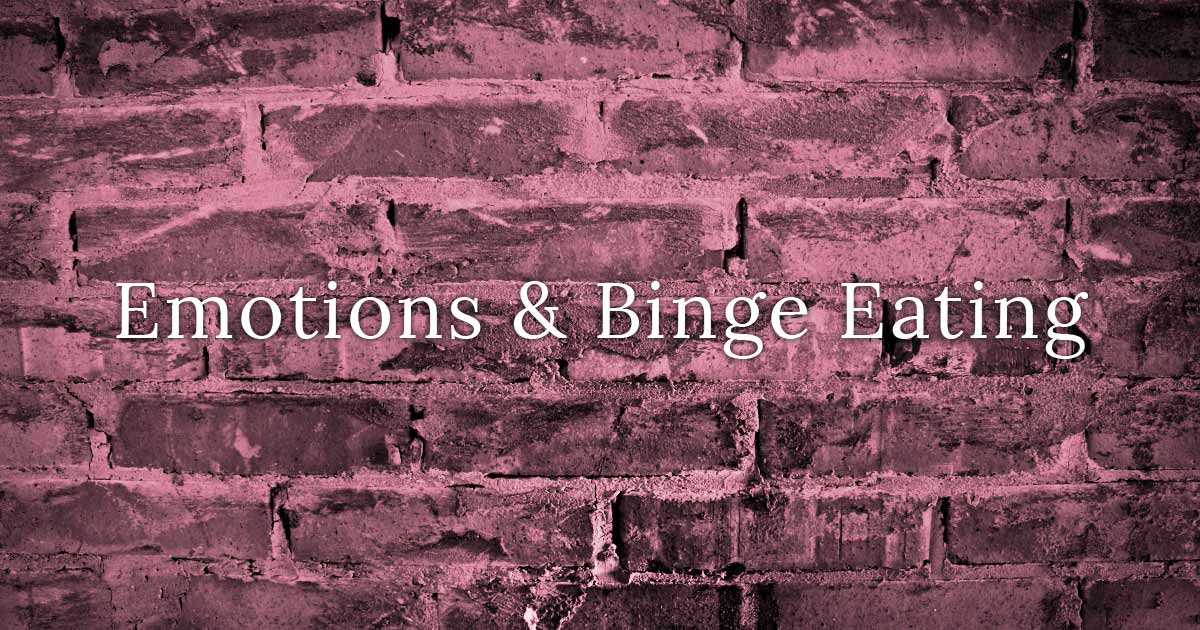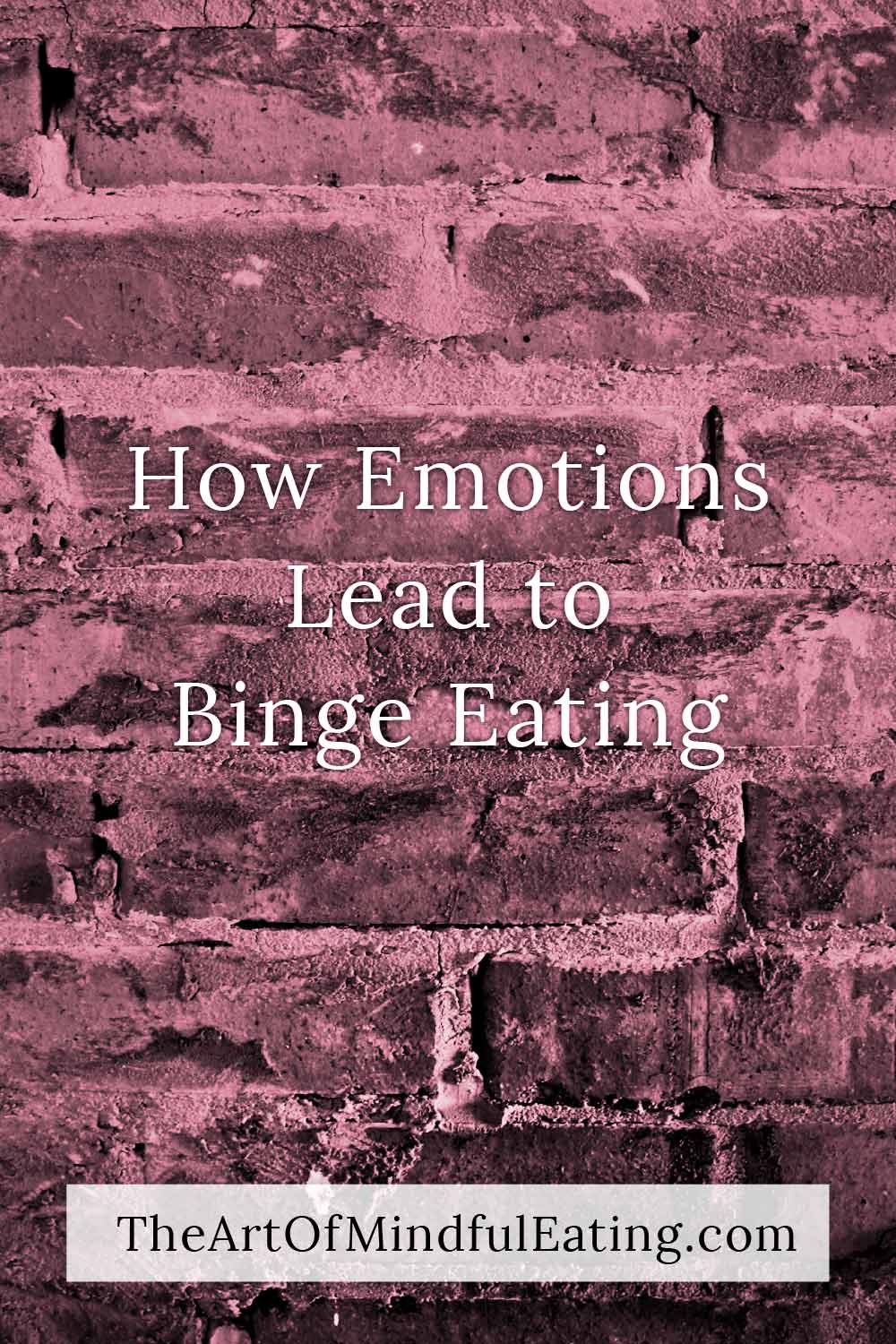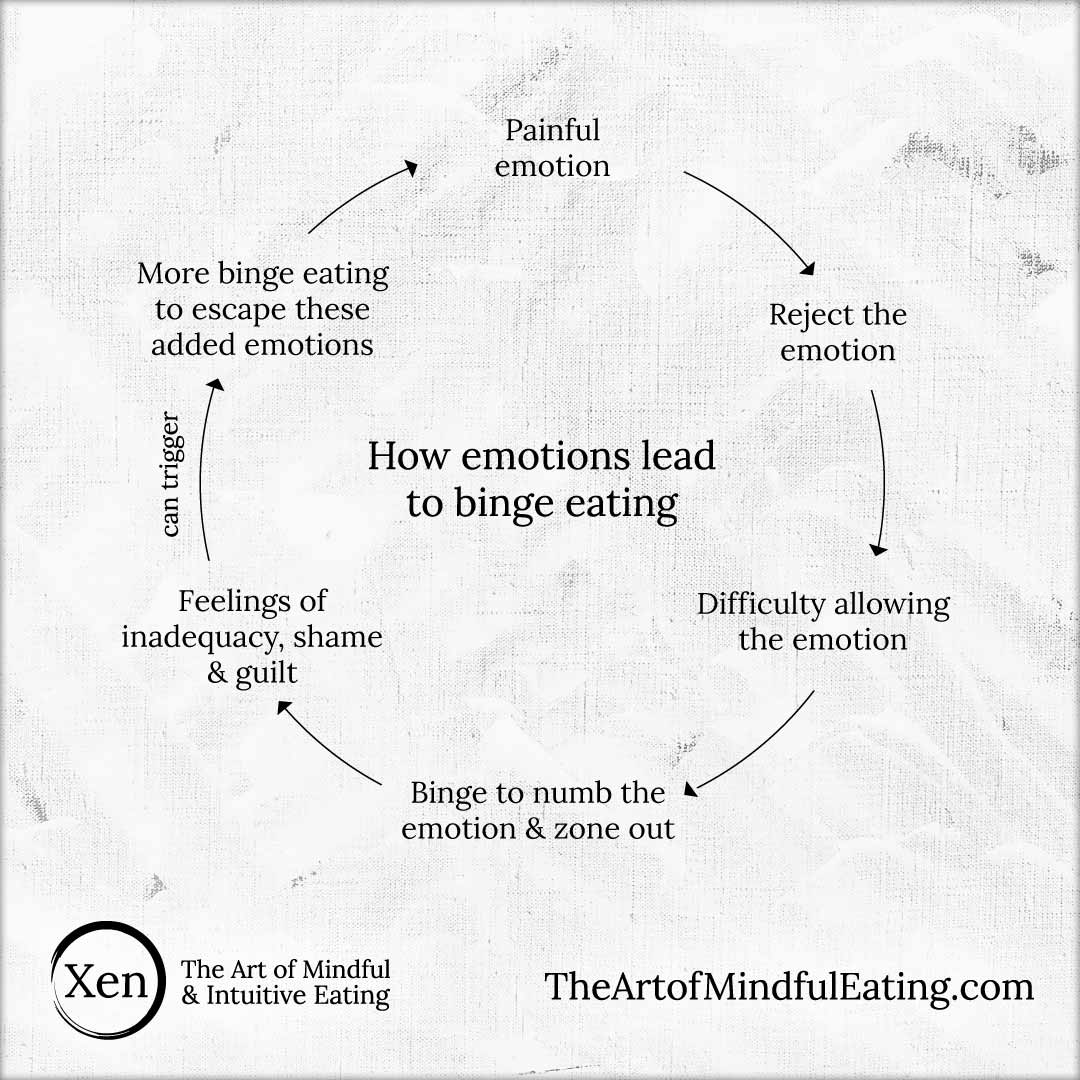How Emotions Lead to Binge Eating

Filed Under: Binge Eating
4 March 2022 | Written by Xenia Ayiotis

Difficult emotions hurt. Nobody likes to feel hurt. We will all experience pain at some point in our lives. Our natural human reaction is to avoid pain. As humans, we will try to do what we can to avoid pain. Every one of us will experience loss, rejection, failure and anger. There is a Buddhist saying that “Pain is inevitable”. Most of us have been taught to deny our feelings and “get on with it” or to distract ourselves from our feelings. Our culture emphasises feeling “positive” all the time, we are told that we need to control our emotions and that feeling negative is wrong, feeling scared or vulnerable is weak. No wonder our instinctive reaction to painful emotions is to bolt. Binge eating is one of the ways we bolt from our feelings. A binge can be a balm that soothes, a distraction or a numbing or a way to go unconscious from difficult emotions.

There is so much shame and guilt attached to binge eating that we mostly see it as a failure, a lack of control. Instead a more compassionate way of viewing binge eating is as a coping tool and to recognise that it has provided comfort and relief in difficult situations.
Common emotions that trigger binges:
Anger
When our boundaries have been crossed, we experience anger. Most of us have difficulty expressing anger and one way to cope is to stuff it down with food. The underlying need when we are experiencing anger could be to speak up and be heard. Binge eating in response to anger can be a way of acting out.
Reflect:
Where in my life do, I need to create boundaries?
In what situations and with who do I need to find the courage to speak up?
Overwhelm
When we don’t meet our basic needs (sleep, regular meals, stress relief) and other deeper needs (safety, variety, connection, solitude, creativity) dealing with difficult emotions can be very challenging. A binge can be a way to rebel against people-pleasing, meeting everyone’s needs except our own. It could be a way we give ourselves time alone.
Reflect:
Where in my life am, I finding it hard to say no?
Where in my life do, I need to set some limits?
Sadness and Loneliness
Humans are wired for connection and belonging. Feelings of loss and isolation are difficult to process. A binge becomes a way to dissociate and go unconscious from these emotions, the binge becomes a companion, it provides relief from reality.
Reflect:
How might binge eating be serving me?
How has binge eating provided me with relief?
How has binge eating disconnected me from others?
Boredom
A sense of meaninglessness or lack of purpose can lead to boredom. Binge eating creates a diversion and distraction. Sometimes it even creates another problem – a purpose – that needs to be dealt with. Binge eating could also be the scapegoat – it’s much easier to blame binge eating than deal with underlying emotions and lack of meaning.
Reflect:
Who would you be without binge eating?
How can I bring purpose and meaning into my life?
Here are more examples of emotional triggers, feeling:
Unsafe, excluded, inadequate, trapped, powerless, worthless, helpless, uncared for, ashamed and unimportant.
Binge eating is a way we get our own attention, it’s a cry for help. In order to deal with binge eating, we need to find different ways to deal with our emotional pain. Stopping may feel scary, as if we are removing a coping mechanism because it could be the way you get through the day. Trying to deal with binge eating by stopping is most likely going to trigger more binge eating. If binge eating has been your emotional life-boat when in distress, it will most likely be your default coping tool. If you have a history of trauma, it is advisable to work with a trauma therapist to address trauma-related binge eating.
The first step to dealing with binge eating is awareness of the triggers and your unmet needs. Understanding and accepting it’s the way we cope. It’s also important to remove the judgement and shame around binge eating and replace it with compassion and curiosity.
When bingeing has been the way to zone out and go unconscious from distress, it takes huge amounts of patience and trust to establish alternative coping tools.
In the next post, I will be sharing some ways to deal with binge eating.
May you find ways to meet your true needs.
May you learn to treat yourself with compassion.
May you be free from suffering.
Wishing you well,
Xen
P.S. Here are two ways to work with me:
- Book a free 30-minute mini-session and let’s explore what is in your way from experiencing peace and freedom with food.
- Sign up for Food Freedom: An 8 Week Mindful & Intuitive Eating Journey to feeling free with food.
You might also be interested in blogs about:
“Words can not describe how Xen changed my life! She freed me from being a prisoner of food because food controlled every aspect of my life since I was a child. I abused my body in so many ways from starving myself, eating to the point of feeling sick to my stomach and using exercise to punish myself for the amount of food I had eaten. Xen also taught me to be kind to myself, to be patient with myself and most of all to forgive myself. She helped me to build a healthier relationship with food and my body image. Xen was patient, kind and listened to what I had to say. Her audio lessons and reading material on her online courses and her youtube channel also helped me enormously in this process. She helped me to live the life I was meant to live and I now look at everything in life (not just food) through a different lens!”
“From our first meeting - two faces on Zoom across the world from each other, there was a sense of familiarity and comfort that was a healing balm for a lifetime of food struggles and dieting. Without realizing how much damage I had done to myself by adhering, for decades, to restrictive food plans and rigid diet programs, Xen had a way of redirecting the harsh and negative self-talk and sending me forth each week with compassion, mindfulness and a new way of seeing myself in the here and now. Gone are the maybe somedays, and if-only, and when-I’m-smaller thinking. Now I am committed to the imperfect and rocky path to listening to my body, accepting my perfect imperfections, and rejecting diet mentality. Those negative voices will revisit me from time to time, I know, but Xen has offered valuable tools for meeting each day as a fresh start - another choice, another chance. Her devotion to this work and her belief in her clients is a remarkable gift; I am so fortunate to have found her. It is never too late to let go of the drama and embrace joy, ease and self-acceptance.”
“I felt hopeless and helpless in my daily struggle with mindless eating for many years. Then I found Xen which is exactly what I needed! My decision to work with her helped me to finally repair my relationship with food. It's changing my life for the better, one day at a time. Now I have control over the food, instead of it having control over me, which is the way it should be. I highly recommend Xen to anyone who has a desire to overcome similar food struggles. Xen, thank you from the bottom of my heart!”
“I reached out to Xenia because 2021 started on a tumultuous note for me. Between deaths, businesses suffering, hospitalizations, and job losses in our personal circle, I felt depleted and found myself being available for everyone but myself. Then I was hit with an unexpected health diagnosis, which was the last straw as it meant giving up “healthy foods” and workouts that I leaned on for my well-being and stability. Despite working in wellness (Yes, coaches and healers are vulnerable too!), I found myself reaching out to desserts for comfort. I like to live a life of permissions (not labels or deprivation leading to bingeing), so I wanted to work with someone who approached healing from a place of mindful compassion. I didn’t want to be my own client. Xenia was great in reminding me to be kind to myself. Working with her, brought me peace and helped shift my mindset. I love how desserts and I look at each other now.”
“Working with Xenia was amazing. She armed me with a bunch of tools to help me through difficult times. Xenia is the kind of person who really cares for helping you in the long run. Her work will forever have an impact in my life.”
“Working with Xen was a game changer for me. After working together for a few months my relationship with food radically changed. I no longer felt like a failure. I now have the tools to nourish my body with foods that feel good in my body. I don’t feel guilty about eating cake or chocolate, I also don’t overeat cake and chocolate. I no longer feel the need to exercise to compensate for my eating. I feel much more free around eating and I am more accepting of my body. Xen has a nonjudgmental and compassionate approach to coaching and really supports you in the process.”
“Working with Xen has been very empowering. Her approach is so refreshing from the usual. I have learned that I am in charge and that I get to choose what I put in my body and how to move my body in a way that I like! I get to make my own choices. It’s so liberating. Once you get a taste of freedom with food, there is no turning back to old ways! Thanks Xen for guiding me along the way to freedom.”
“This is the answer for those of you that struggle with food and all that surrounds it. Xenia said that I could make peace with food and it seemed at the time like an impossible dream. Turns out it isn’t. I recommend Xen and the mindful eating / intuitive eating approach unreservedly. If you have any questions about my experience, please get in touch. Thank you Xen. My rating: ⭐⭐⭐⭐⭐”
“Xenia was a walking, living, breathing example of what can be done. I laughed and cried my way through a short course in this fascinating and invigorating programme with her, and have gained a designer tote full of coping skills that go way beyond containing kilogrammes. I feel infinitely lighter. I am doing this for me and, yes, you can do this for you too! And believe me, I’m cynical!”
“I don’t obsess about food like I used to. I am thinking differently about food and feeling so much more relaxed around all types of food. It’s wonderful to have pleasure and satisfaction from eating.”
“I learned a new way of thinking about food. I have learned that food is not the enemy and that it can actually be enjoyed with no guilt.”




